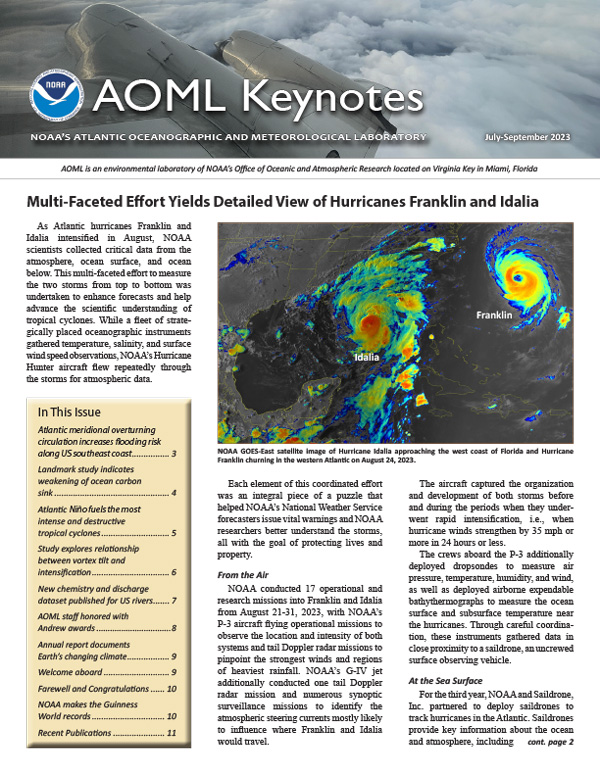Crossing the Equator and Navigating Icebergs: The A13.5 GO-SHIP Returns After 52 Days At Sea
Wind, waves, and icebergs pierced through morning fog – the A13.5 GO-SHIP cruise proved both tumultuous and rewarding with vast amounts of new data that bring the promise of groundbreaking future research. After 52 days at sea, the A13.5 GO-SHIP cruise (short for “Global Ocean Ship-based Hydrographical Investigations Program”) returned to Cape Town, South Africa […]
NOAA Pioneers New Ways to Advance Hurricane Forecasting
November 30th marks the official end to the 2023 Atlantic hurricane season. Scientists and forecasters from across NOAA pushed boundaries as they worked throughout this active season to conduct crucial tropical cyclone research that will strengthen our ability to forecast future tropical cyclone development and better protect those most affected.
Failing Upwards: Developing an Autonomous Surface Vehicle to Advance ‘Omics Research
For engineers and scientists, sometimes failure means progress. When developing a new technology, the process is to field test, fail, tweak, and test again, each time failing a little less and learning what does and does not work until – finally – they get it right. On August 5, 2023, scientists from NOAA’s Great Lakes […]
A Bold and Unprecedented New Effort to Tackle the Vast Threats to Marine Ecosystems
NOAA announced $4.2 million in funding awarded to a collaborative project entitled the Florida Regional Ecosystems Stressors Collaborative Assessment (FRESCA), co-led by NOAA’s Atlantic Oceanographic & Meteorological Laboratory (AOML) and the University of Miami, and involving seven different academic and research institutions.
NOAA Measures Hurricane Tammy from Satellites through the Sea
NOAA hurricane researchers successfully deployed a new uncrewed aircraft system (UAS) into Tropical Storm Tammy (2023) near an uncrewed surfance vehicle, saildrone, to measure parts of the storm too dangerous for humans to go. The Altius 600 UAS was launched from the NOAA WP-3D Orion Hurricane Hunter aircraft by scientists from NOAA’s Atlantic Oceanographic and Meteorological Laboratory during missions into the storm in coordination with the saildrone researchers and pilots.
Landmark study analyzes global ocean carbon storage over two decades, indicates weakening of ocean carbon sink
A landmark study published last week demonstrates that the ocean’s role as a carbon sink and its ability to store anthropogenic, or human-caused, carbon may be weakening. A collaboration among international researchers led by Jens Daniel Müller, Ph.D. (ETH Zurich), this study captures a snapshot of three decades of global interior ocean measurements to determine […]
The Future of Hurricane Forecasting: Hurricane Analysis and Forecast System
AOML’s Hurricane Modeling Group was founded in 2007 to advance hurricane forecast models through development and targeted research. From inception, the team has worked to improve NOAA’s hurricane modeling systems; first with the legacy Hurricane Weather Research Forecast (HWRF) model, and now with its transition to the next generation model, Hurricane Analysis and Forecast System (HAFS).
First NOAA GO-SHIP Cruise In 5 Years Departs To Study Unique Atlantic Basin
Originally published at NOAA Global Ocean Monitoring & Observing on March 7th, 2023. 30-years of ocean observations provide view into long-term ocean trends On March 6, a team of scientists on the NOAA Ship Ronald H. Brown departed from Suape, Brazil for a 55-day cruise to the northerly waters of Reykjavik, Iceland. With 150 planned stops along this […]
NOAA Cruise Ensures Flow of Critical Climate and Weather Data and Supports Collaborative Science
Researchers with NOAA’s Atlantic Oceanographic and Meteorological Laboratory (AOML), NOAA’s Pacific Marine Environmental Laboratory (PMEL), NOAA’s National Environmental Satellite, Data and Information Service, and partners set sail from Bridgetown, Barbados aboard NOAA Ship Ronald H. Brown on November 1st, 2022. Over the next 40 days, the crew and scientists recovered and redeployed key moorings in the Prediction and Research Moored Array in the Tropical Atlantic (PIRATA), deployed an additional mooring, and serviced two equatorial PIRATA buoys in support of the PIRATA Northeast Extension project and broader PIRATA objectives. They also conducted a number of research projects on the ocean and atmosphere that advance our understanding of carbon absorption in the ocean and atmospheric pollution.











